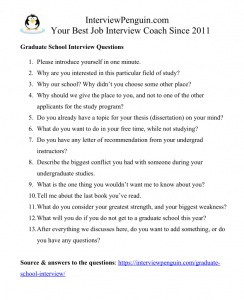Bachelor’s degree is just the first step on your academic journey. In order to pursue some interesting career paths, or to really dive into your favorite field of research work (and perhaps remain an academic for the rest of your life), you have to continue with your studies.
But before you can continue with them, you have to successfully navigate the admission process. And while the acceptance rate on most graduate schools is significantly higher than on most professional schools such as PT school, med school, or nursing school, it’s still not guaranteed that you will make it. Not everyone will.
In this article we will look at the face to face interview at grad school, perhaps the most tricky part of the entire admission process. Let’s have a look at the questions you may face, and how you should answer them.
Table of Contents
Please introduce yourself in one minute.
One minutes is not a very long time. What will you say them? What will you focus on? And, what do they really observe?
First of all, they observe whether you are authentic. Do you look them in the eyes? Do you talk to the point? Are you enthusiastic when talking about your academic or professional journey? Remember that whatever you tell them, your non-verbal communication is the most important thing.
The sort of energy you show in the interviews, your attitude–such things can be read from your face and words, regardless of what you are talking about. Keep it on your mind when introducing yourself in an interview.
In terms of the best content of your answer, you can try to tell them a short story, one that culminates in the very moment of interviewing for the place in their study program.
Story of a dream you had, career you wanted to pursue, and the steps you took to turn your dream into reality (a particular high school and college studies, part time job etc). The next step is a Master’s degree in the field, and that’s why you are in the room with them today.
Another alternative is a simple introduction: Who you are, where you are from, your undergrad studies and research work, and one or two things you enjoy doing in your free time. As long as your non-verbal communication indicates the right things (I outlined them earlier), they will be satisfied with your answer.
* May also interest you: Does your academic record accurately reflect your capabilities?
Why are you interested in this particular field of study?
In a best possible case, you should have a vision. Some point in a foreseeable future, a job you want to have, or a work you want to do, once you successfully earn your graduate degree (and perhaps take a few more steps on your career journey afterwards).
The key is to focus on the future, and not on the past. Saying that you want to earn a Master’s degree in economics because you always excelled in Math, or because your sister got a well-paid job with the same degree, is really a bad answer.
Tell them where you see yourself in five years time, what you want to do and how you’d like to contribute to the prosperity of the human society. As long as the degree you want to earn with them plays a role in the process of attaining your vision, you’ll earn the maximum number of points for your answer.
Why our school? Why didn’t you choose some other place?
The answer is much easier when you earned your undergrad degree with the same university or school. Why would you apply anywhere else? You know the place, you have made your connections, you were happy with the teachers and the quality of the classes.
As long as they offer the study program you want to pursue, continuing with them is the most logical step.
The situation changes when you apply somewhere else. In such a case you can praise their school–great reputation, excellent research work of the postgrad students, modern equipment they have in place etc. Choose something what makes them stand out (at least in your eyes), and explain it in an interview.
Another option is referring to a particular field of research work you’d like to pursue. Maybe they’ve been working on the same subject at the school, and you will easily find a team to join, or at least a good leader and consultant in one of their professors. Or they have a funding allocated for the field of your interest. One way or another, they can offer you something the others cannot.
Last option is something we call “brutal honesty“. This approach is a bit risky though. In some cases it can do wonders for you, in other cases it can leave your interviewers puzzled. Brutal honesty is for example saying that you failed to get into the school of your choice (or even more schools) and so you are trying to get anywhere you can, in order to not waste a year doing nothing…
Why should we give the place to you, and not to one of the other applicants for the study program?
The key is to show them that you do not want to study only, earning something from them without repaying it. You also want to give back. What can you give back to the university, and to the community of students and teachers? Actually a lot of things, see just some ideas:
- Say that you want to be active in the student’s community, applying for a job of a resident assistant, or for a place in a student council, basically that you want to try to do something for your fellow students while not studying.
- If you excel in athletics, or in any other sport, you can say that you’d love to represent the colors of their university in the university league or other competitions, helping them to gain prestige, and recognition.
- Maybe you have a very specific research work on your mind. Something that either aligns strongly with the work they already do at the university, or something groundbreaking, something that can again bring them into spotlight and help them gain more recognition, funding, etc.
When you manage to convince them that you aren’t in only for student life, partying, and earning a degree somewhere in between the two, but want to do something for the community of students and educators, or for the uni as an organization, they will be very happy about your answer.
Do you already have a topic for your thesis (dissertation) on your mind?
You should have something, at least vaguely. You may want to continue with the field you’ve focused on in your bachelor’s thesis, the research part, or you can pursue a completely new field.
Again, try to speak with enthusiasm about your thesis. Explain the research part, in which way you hope your work to be unique, and how it can help to address some problem or challenge, basically the application in real life.
Your thesis is the most important part of your graduate studies. Unless you have a clear vision in your mind about the field you want to research, the work you want to do, you’ll struggle to make an impression on your interviewers and pass the admission interviews…
Other questions you may face in your grad school admission interview
- What do you want to do in your free time, while not studying?
- Do you have any letter of recommendation from your undergrad instructors?
- Describe the biggest conflict you had with someone during your undergraduate studies.
- What is the one thing you wouldn’t want me to know about you?
- What inspires you in life?
- Tell me about the last book you’ve read.
- What do you consider your greatest strength, and your biggest weakness?
- What will you do if you do not get to a graduate school this year?
- What is your vision in life?
- After everything we discusses here, do you want to add something, or do you have any questions?
* You can also download the list of all questions in a one page long PDF, and practice your interview answers anytime later:

Conclusion, next steps
The admission process and the requirements for application vary a lot from one graduate school to another, or even from one study program to the next.
You should do a good research to find out what matters, and perhaps even consult a person who’s in charge of the admission process at the particular program you apply to.
This will hep you to come up with the right answers in your interview. Once you know what matters for them the most (your grades, intentions, research work, willingness to give back, interests, personality and attitude, etc), you can refer to these things in your answers.
You should also try to prepare a short answer to each question from this article, and perhaps practice your answers with the friend. Most importantly, remember that your non-verbal communication matters as much as the words you say in the interview. Once they see and feel your enthusiasm for the studies and for your future, and an attitude to try your best and to give back to the community of students and educators, it will be much easier to succeed. I wish you good luck!
Matthew
May also interest you:

